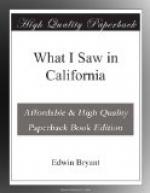California, until recently, has had no commerce, in the broad signification of the term. A few commercial houses of Boston and New York have monopolized all the trade on this coast for a number of years. These houses have sent out ships freighted with cargoes of dry goods and a variety of knick-knacks saleable in the country. The ships are fitted up for the retail sale of these articles, and trade from port to port, vending their wares on board to the rancheros at prices that would be astonishing at home. For instance, the price of common brown cotton cloth is one dollar per yard, and other articles in this and even greater proportion of advance upon home prices. They receive in payment for their wares, hides and tallow. The price of a dry hide is ordinarily one dollar and fifty cents. The price of tallow I do not know. When the ship has disposed of her cargo, she is loaded with hides, and returns to Boston, where the hides bring about four or five dollars, according to the fluctuations of the market. Immense fortunes have been made by this trade; and between the government of Mexico and the traders on the coast California has been literally skinned, annually, for the last thirty years. Of natural wealth the population of California possess a superabundance, and are immensely rich; still, such have been the extortionate prices that they have been compelled to pay for their commonest artificial luxuries and wearing-apparel, that generally they are but indifferently provided with the ordinary necessaries of civilized life. For a suit of clothes, which in New York or Boston would cost seventy-five dollars, the Californian has been compelled to pay five times that sum in hides at one dollar and fifty cents; so that a caballero, to clothe himself genteelly, has been obliged, as often as he renewed his dress, to sacrifice about two hundred of the cattle on his rancho. No people, whether males or females, are more fond of display; no people have paid more dearly to gratify this vanity; and yet no civilized people I have seen are so deficient in what they most covet.
[1] This was in September, 1846.
In June, 1847, when I left San
Francisco, on
my return to the United States, the population had
increased to about
twelve hundred, and houses were rising in all
directions.
CHAPTER IV.
Climate of San Francisco
Periodical winds
Dine on board the Portsmouth
A supper party on shore
Arrival of Commodore Stockton at San Francisco
Rumours of rebellion from the south
Californian court
Trial by jury
Fandango
Californian belles
American pioneers of the Pacific
Reception of Commodore Stockton
Sitca
Captain Fremont leaves San Francisco for
the south
Offer our services as volunteers.




